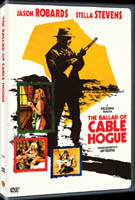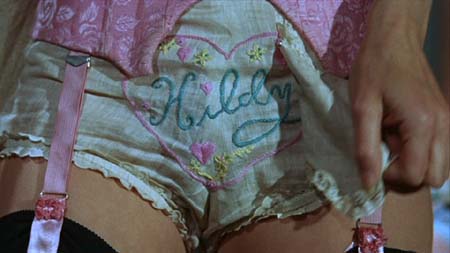 BUY IT AT AMAZON: CLICK HERE!
BUY IT AT AMAZON: CLICK HERE!
STUDIO: Warner Brothers
MSRP: $19.98
RATED: NR
RUNNING TIME: 121 Minutes
SPECIAL FEATURES:
• Commentary by Nick Redman, David Weddle, Paul Seydor and Garner Simmons
• The Ladiest Damn’d Lady
• Trailers
(This is part of the brilliant new Sam Peckinpah box set. Get to the other reviews and the artwork evaluation here, or just go buy the set from Amazon! I’ve also got to admit that I couldn’t bear to add screencaps. Feel free to make your own.)
If I had to label my favorite Peckinpah film, it would be a toss-up between Bring Me The Head of Alfredo Garcia and this one. I love Garcia‘s viciousness and refusal to compromise. I revere the performance of Warren Oates. Watching that movie is like drinking a bottle of Jack Daniels in a gulp, then doing it again every twenty minutes for two hours.
The Ballad of Cable Hogue is the total opposite. It’s the man’s most entertaining film, his lightest and most hopeful. It’s the movie where Peckinpah’s lifelong religious influence is given a totally unique voice, and the place where Jason Robards got to cut loose like nowhere else. There’s no better proof of Peckinpah’s versatility; here as always his themes and obsessions are on display, but explored and even toyed with in a way that beautifully goes from grave to lighthearted and back again. This is the movie that will surprise and likely impress anyone who thinks The Wild Bunch is the beginning and end of Sam Peckinpah.
The Flick
In the middle of the desert, Cable Hogue (Jason Robards) is left to die. His partners Taggert and Bowen (L.Q. Jones and Strother Martin, always fantastic) abscond with his horse and water, figuring Hogue for buzzard bait. Crawling the sand and talking to God, Hogue finds his own water. He lives.
An enterprising sort, Hogue sets up shop, selling water to travelers. His entrepreneurial sprit isn’t pure, though. He’s hungry for vengeance, biding his time secure in the belief that Taggert and Bowen would pass through again. So he waits. Turns out Cable Springs is halfway between Dead Dog and Gila, and Hogue’s business is brisk.
.jpg)
The Ballad of Cable Hogue is remarkable for plenty of reasons, the first of which is the helpfulness of those Hogue meets. The land claim clerk is easy enough to deal with; the banker and stagecoach men are positively friendly. This isn’t the West we’re used to, where every transaction is cutthroat and close-played.
The nicest is Hildy (Stella Stevens), a whore in Dead Dog who wins Hogue’s heart. This is no pure old-fashioned romance, though. Hogue gets a little…distracted by Hildy’s body, and Peckinpah cuts a crudely funny montage where Hogue keeps flashing back to a close-up of cleavage. After the hellish climax of The Wild Bunch, you’ve got to love seeing the same editing techniques turned to a more wholesome subject.

They grow into a true if unlikely pair. Peckinpah doesn’t traffic in amicable fellows, but Hogue? He’d be alright to drink with. Hildy knows it. This is the first and only Peckinpah film that could be called a love story, and he’s surprisingly good at finding tenderness in the roughest folk. Hildy’s got her own ambitions, but as time goes on she’s obviously willing to put them aside for Hogue. His vengeful desire isn’t so easily swayed, and the quiet moments get tense as Hogue’s single-mindedness threatens to destroy him.
When Hogue can’t rely on his own instincts, he finds clarification from Joshua (David Warner), an itinerant preacher who becomes Hogue’s second customer. Josua presides over a church of ‘his own revelation’; his sermons seem primarily directed at soft young women in need of solace. As Hogue notices, that white collar comes off pretty quick. Warner makes Joshua into a fantastic creature, with a supremely understated sense of comedy.
.jpg)
Obviously then, Joshua is partially comic relief; his seduction of a grieving young lass is hilarious, if squeamishly so. Peckinpah’s taste is twisted. But Joshua is also a spiritual voice and honest friend. He and Hildy change Hogue, or at least make him realize that he needs to change, and that’s enough to give the film a sense of hope that Peckinpah rarely offers.
As always Peckinpah reinforces all his ideas visually, and often without flash. The occasional god’s-eye view suggests that Cable’s one-sided conversations aren’t going unheard. Cable and Joshua communicate with the looks and expressions that Peckinpah typically coaxes from his leads. Turns out he’s got great comic timing, too, as he cleverly cuts great sequences that are almost slapstick. Who’da thought?
The film’s spirituality isn’t all optimism. God saves Hogue by giving him water, but he’s not all that pious in his thanks. "Toldya I was gonna live. This is Cable Hogue talking! Hogue. Me! Cable Hogue! I did it." God seems to reward Hogue for his generally good nature, but there’s also a sense of vengeance or penance held back. Hogue isn’t the only one waiting to get revenge; after his selfish water claim, God might be ready to jerk Hogue’s string back at any time.
.jpg)
Then there’s the opinion that suggests that Hogue never makes it out of the desert at all, that the entire story is his fantasy before death. That’s one of the reasons the film is so wonderful, though — it invites a dozen equally valid readings. It’s even more interesting for being fundamentally flawed. The ending is almost abruptly unsatisfying, and you can feel Peckinpah reaching for things that don’t always come together. The vengeance plot wavers, going unmentioned for long stretches of film.
Even so, the movie is rich in a way that’s unmatched in Peckinpah’s westerns. Cable Hogue is the American Dream personified, and his fate is the end of the west. The movie describes a spirituality disdainful of organized religion, but one that feeds the soul all the same. Part of that un-organized religion is the simple joy of existence, where men and the land that supports them can co-exist. This one feels personal. Surviving crewmembers say that Robards’ excellent performance is a detailed sketch of the director himself. Oddly enough, people say the same thing about Warren Oates in Bring Me The Head of Alfredo Garcia, which is this film’s complete opposite.
.jpg)
Every Peckinpah film is stained with backstage irony, and Cable Hogue is no exception. It seems to be Sam having fun for the first time, but in reality loads of people were fired from the production, and only a few key crewmembers started and finished the film together. Storms besieged the location and the film was constantly on the verge of falling apart. You’d never know it while watching the film, though, which is just one more testament to Peckinpah’s skill and force of will.
There’s no more weird and touching movie in his career. The near perfection of The Wild Bunch makes it mythic; the many imperfections of Cable Hogue make it feel even more real. I enjoy the hell out of it every time I watch.
8.7 out of 10
The Look
Like The Wild Bunch, some of the longer shots are very slightly soft, but medium and close-up takes look pretty good. This transfer isn’t of superior quality, though. The reds are too hot and there’s a lot of noise in skies. But since my only other reference point is videotape I’m still ecstatic.
(I never saw a domestic laser release, though I believe there was one. There might have been a Japanese pressing as well.)
You can really see what the transfer reveals in the title sequence, which uses loads of opticals to break the frame into small windows. Watch the first wipe just before the title comes up — there’s a huge dip in image quality as the opticals are laid in. Shows what using dissolves and wipes quick and on the cheap does to you. A full restoration could even it all out. Since Warner Brothers is probably losing money on this film even now, I’m not holding my breath.
7.8 out of 10
The Noise
The main track is even and sounds just fine. What I like most about this soundtrack, though, is the Voice of Robards. I want to start an oracle in Greece and name it that. Robards has an incredibly nuanced croak in this film that I can listen to over and over.
8 out of 10
The Goodies
It’s four-man commentary number three! I wonder if these were recorded in the same order that I’m reviewing them, because this might be the best one yet. It’s more loose, with banter that moves it along. Some of that probably can be chalked up to the fact that this is a funny, tender and slightly strange film. There’s a lot to argue about and the bio boys make the most of their time.
The Ladiest Damn’d Lady isn’t so hot, though. In fact, I just deleted a whole paragraph that was too savage a take on it. I’ll let it go at this: it’s a shoddily produced piece that runs too long on a subject that isn’t as interesting as they imagine. There are good bits in here, especially since Stevens has one of the most wavering opinions of Peckinpah among his alumni, but on the whole this is a trial.
Portions of the studio backed ‘making of’ featurette are cut into Legacy of a Hollywood Renegade on the Wild Bunch disc. I really resent that it’s not included in full here. This was such a hard-fought production that even a studio whitewash would be interesting.
(Assuming the thing was ever finished and released, since Warner Brothers buried Cable Hogue. Amusingly, one of the two guys involved in the making of — Gary Weis — protested when Peckinpah was about to blow up the lizard for the film’s opening. Sam said he’d do the shot another way if the kid would cut off his long hair and beard. The kid said that wasn’t the point, kept his hair and Sam blew up the lizard. The kid married his daughter. [from A Portrait In Montage.])
6 out of 10
Overall: 8.8 out of 10